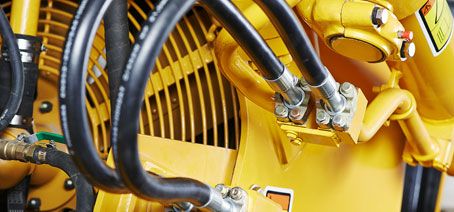Environmentally adapted lubricants with top-level performance
Nowadays there are many environmentally adapted lubricants that offer top-level performance. These products are an everyday feature in large parts of the forestry industry, and the construction industry is going the same way. To meet demands and win new business, it is key to have the right lubricants in the hydraulics.
Today, many environmentally adapted lubricants even offer better performance than the equivalent mineral oils, for instance in terms of life span, air and water separating properties. This is well known in forestry, where green hydraulic oils are commonplace. Changes in the construction industry now await, with local authorities and other major clients placing tougher environmental demands on their suppliers.
FORESTRY AT THE FOREFRONT
The first environmentally adapted lubricants were launched in the early 1990s. They were rapeseed oils and the products found their first foothold in the forestry industry. Their appearance was linked to tougher environmental requirements, partly because there were frequent oil spills in sensitive natural areas. This led the industry to make a concerted effort to find alternatives to mineral oils. .
PERSISTENT MISCONCEPTIONS
Another important factor was that the first, rapeseed oil based hydraulic oils were not quite up to scratch. Problems were related to worse low temperature properties, oxidation, and seals in the machines that took a beating. Their performance was improved when the products were further developed and began being based on synthetic and saturated esters. But the memory of those early teething problems lives on and still affects people’s attitudes towards green lubricants in some industries.
SUSTAINABLE ENVIRONMENTAL CRITERIA
As a leading lubricant supplier, over the years we have worked with a wide range of different companies and organisations, carried out environmental studies, product lifecycle analyses and much more. These were important steps in our journey towards an environmentally adapted range. Early on there were also sustainability criteria which remain largely the same today. These include that lubricants must be biodegradable, contain renewable raw materials, produce energy savings or contribute to a better working environment.
TOP-PERFORMING LUBRICANTS
Environmentally adapted hydraulic oils have been the main driver of the development. Nowadays the products are natural in the forestry industry, where clients place tough environmental demands on their contractors. Today’s high-quality products also perform at the highest level, and as mentioned above are often better than the equivalent mineral oils. I’ve already mentioned the longer life span and the better air and water separating properties. Another benefit is that these hydraulic oils can withstand wider temperature ranges. They also have better shear stability, which means that the oils retain their viscosity throughout their service life.
A CHALLENGE FOR THE CONSTRUCTION INDUSTRY
Environmental requirements have also been toughened in the construction industry. Large local authorities, construction and civil engineering firms conduct their own environmental work and expect their subcontractors to do their part as well, partly by ensuring that they have the right fluid in the hydraulics. The requirements therefore serve as a kind of control mechanism, which influences the machine owners’ potential for winning new business.
At present there are relatively few companies in the construction industry that use environmentally adapted lubricants. This could be because misconceptions about the products live on, i.e. that they are messy, have a short service life, damage seals, are unable to cope with cold, and so on. We have carried out studies and are able to show, point by point, that environmentally adapted hydraulic oils are just as good – or better – than traditional products.
GOOD FOR BUSINESS – AND THE ENVIRONMENT!
Moreover, miscibility problems when changing tools are no greater with environmentally adapted lubricants than with mineral oils. A good rule of thumb here is always to use the same oil in machines that share tools. And, again, there are some really good green products on the market.
One final tip is therefore to start thinking more green also in the construction industry. Bearing in mind the requirements, it will be good for business – and of course for the environment as well!
If you have any questions or need help in any way, please feel free to contact us.

All blog posts
Subscribe
Available in Finnish only.
Smart Lubrication
Smart Lubrication is a blog from FUCHS where we share our common knowledge about lubricants and lubrication.


